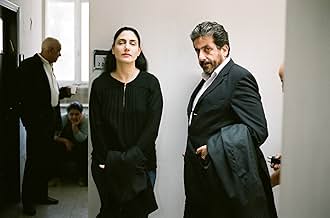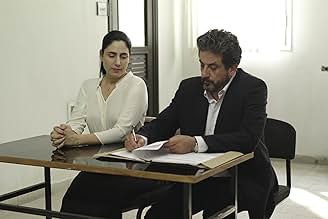Após um casamento de mais de vinte anos, uma mulher apela à compaixão de seu marido para obter um documento de divórcio há muito esperado no tribunal, o que se revela mais desafiador do que ... Ler tudoApós um casamento de mais de vinte anos, uma mulher apela à compaixão de seu marido para obter um documento de divórcio há muito esperado no tribunal, o que se revela mais desafiador do que ela esperava.Após um casamento de mais de vinte anos, uma mulher apela à compaixão de seu marido para obter um documento de divórcio há muito esperado no tribunal, o que se revela mais desafiador do que ela esperava.
- Direção
- Roteiristas
- Artistas
- Prêmios
- 15 vitórias e 19 indicações no total
- Rabbi Shimon
- (as Sasson Gabai)
- Head Rabbi Salmion
- (as Eli Gornstein)
- Rabbi Abraham
- (as Roberto Pollak)
- Rachel Amzalleg
- (as Rubi Porat Shoval)
- Direção
- Roteiristas
- Elenco e equipe completos
- Produção, bilheteria e muito mais no IMDbPro
Avaliações em destaque
Several comments: first, this movie is co-written and co-directed by Ronit Elkabetz (who also plays the role of Viviane) and Shlomi Elkabetz (whom I believe is her real-life husband). Second, 95% of the movie plays out in the court room, and as such is really more of a filmed stage play than it is a movie in the traditional sense. The movie consists is various family members and friends testifying as to why the divorce should, or should not, be granted. Third, most importantly, this movie spotlights the many absurdities of the Israeli court system, at least how it relates to divorce matters. The judges are rabbis and, most appallingly, the true power is held by the husband, who apparently must consent to granting the divorce. Without the husband's consent, not even the court can impose the divorce. In that sense, this movie demonstrates how a husband can abuse his wife psychologically, and there is nothing anyone can do about it. For that reason, I found the movie deeply disturbing, although I am also aware that, sadly, Israel is far from the only country where women are treated in this manner. Bottom line: "Gett: The Trial of Viviane Amsalem" is very much worth seeing, but let the viewer be aware: you may likely be pretty upset about what plays out in this Israeli divorce court drama.
I saw this movie recently at the Silverspot Cinema in Naples, FL. The early evening screening where I saw this at was quite nicely attended, which surprised me, given not only the nature of the movie, but also the theater-like style of the movie. If you are in the mood for a top-notch foreign divorce court drama that will challenge you in more ways than one, you cannot go wrong with this. "Gett: The Trial of Viviane Amsalem" is HIGHLY RECOMMENDED!
This is the final piece to the creative siblings' trilogy on Israeli marriage that began with To Take a Wife (2004), and was followed by 7 Days (2008). That's right, the two characters of husband Elisha (Simon Ebkarian) and wife Viviane (played by director Ronit Elkabetz who was also in the excellent 2007 film The Band's Visit) have been followed through the stages of marriage, separation, and now divorce court. Only their divorce court is not what most of the world thinks of when we hear that term. In Israel, divorce is not a civil matter, but rather falls under Jewish law and the proceedings are overseen by a triumvirate of rabbinical judges. If that's not difficult enough to stomach it's the husband who holds ALL the power. The husband must agree to grant his wife the divorce. Without his permission, the judges can do nothing and the wife is bound to the marriage.
With the story unfolding almost exclusively in the bleak courtroom, Viviane trudges through delays, no-shows, desperate negotiations, and other time-wasters; only occasionally succumbing to an outburst, rather than her usual quiet dignity. Elisha maintains a seemingly proud and determined look when he does show for hearings, only periodically shooting a look of disgust at his wife. His confidence stems from the power in knowing that grounds for divorce do not include irreconcilable differences. The camera work puts us right in the courtroom and we soon recognize Elisha's mannerisms as not just passive-aggressive, but also manipulative and misguided. He is not an awful man, but this is an awful marriage.
Long a fan of courtroom dramas, I was mesmerized by the dumbfounding process as well as the stellar performances, excellent script and POV camera work. Ms Elkabetz is terrific as Viviane, and her work is complimented by Mr Ebkarian as her husband, Sasson Gabay as his brother and advocate, and Menashe Noy as her advocate and admirer. The film is a strange blend of hypnotic and infuriating and heart-breaking. It's uncomfortable to watch, but one we can't turn away from especially as Viviane shouts "You don't see me!" to the judges.
Without a Get, neither spouse can remarry. If the man abandons his wife and leaves the country, the woman is in a legal limbo. This was the subject of an earlier short Israeli film, Ha-Get. In Gett, the man is available but refuses to consent. The Rabbis try all the limited avenues available to force consent (take away the driver's license, jail, etc.) but can't force the man to sign. That is the basis of Gett.
I have given Gett a 9 despite the lack of action and the focus on a less than universal problem. My reason is that, while watching Gett, I found similarities to the classic 12 Angry Men. I realize that it's a different courtroom and type of case on trial but that static tension is present in both films. The second reason is the acting skills displayed, particularly by Ronit Elkabetz. Even if you knew nothing about the divorce problem in Israel, you can read in Ronit Elkabetz' character the agony and frustration that getting a Get can cause.
I highly recommend Gett.
I learned--after watching the film--that Gett is actually the third movie in a trilogy about this couple. Although it would probably make sense to watch the trilogy in chronological order, Gett stands on its own as a powerful and complete film. The script contains references to earlier events, but they are presented clearly enough to allow us to understand them.
All of the actions take place in the rabbinical courtroom in Israel, and in the waiting room of the courtroom. There's not a single shot of anything outside the courtroom. It's a truly claustrophobic setting, especially because the courtroom and waiting room are devoid of any color or any objects of interest, other than the actors.
Both of the leading actors are superb. Our heart goes out to Viviane Amselem, who simply wants a divorce. She appears to be a fine person--honest, honorable, and someone who has made a real effort to be and remain a good wife. However, the marriage for her is dead, and she wants to leave the marriage and move on with her life. She has wanted this for five years, and still she is not divorced.
Her husband, Elisha, is not a cardboard cutout villain, which would actually make things easier for us as viewers. He is a handsome, intelligent, well-spoken man. However, he appears emotionally cold and aloof. I wonder if he might have a condition somewhere along the autism spectrum. Certainly, his interactions with others--the judges, his wife, the witnesses--are uniformly cold and almost robotic.
What we learn is that there is no such thing as a "civil court" for divorces in Israel. The rabbinical court is the only court. In the United States, a highly observant Jewish woman might go to a rabbinical court to obtain a Gett. If her husband refuses to give her a Gett, she can't be divorced from a religious point of view. However, if she is desperate enough, she has the choice of going to a civil court and getting a legal divorce. (This may not be considered an option by a highly observant woman, but she has the legal option, whether she chooses to use it or not. In Israel, she doesn't have the legal option.)
What I took away from this film is that the Israeli legal system is broken in respect to divorce. The rabbis can ponder. They can quote from the Talmud. They can subpoena witnesses, they can freeze someone's bank account or credit cards. They can cajole, they can reason, they can fume. What they can't do is make a husband give his wife a Gett.
This film was shown at the excellent Dryden Theatre in Rochester, NY as part of the matchless Rochester International Jewish Film Festival. Unfortunately, we were unable to be at the theater that night, so we bought the movie on DVD. It worked very well on DVD--it's basically a courtroom drama, so there's not any scenery or action shots that would do better on a large screen.
Note: A booklet was Included in the DVD, which contained commentary about the film. That's how I learned about the two earlier movies: To Take a Wife (2004) and Seven Days (2008).
Você sabia?
- CuriosidadesRonit Elkabetz's final film before her death.
- Erros de gravaçãoVivian wears only one big ring on her forth finger of her left hand throughout most of the movie. Somewhere in the middle of the movie, Vivian is shown sitting at the bench in the "court" and there is also a second ring on her second finger.
- Citações
Viviane Amsalem: Why are you making me run around in circles? Why, Your Honor? Why? Why have I come in and out for years now and nothing's changed? Why? You can't force him to divorce nor to appear, and you can't this or that, and what about me? When will you see me? When I'm too exhausted to stand before you? When? If it were up to you, it could go on for 10 years. I could drop dead in front of you and all you'd see was him! But nobody is above the law. There's a God and there's justice and He'll judge you as you judge me. Mercilessly. You don't care about me!
- ConexõesFeatured in 72nd Golden Globe Awards (2015)
Principais escolhas
- How long is Gett?Fornecido pela Alexa
Detalhes
Bilheteria
- Faturamento bruto nos EUA e Canadá
- US$ 988.150
- Fim de semana de estreia nos EUA e Canadá
- US$ 24.210
- 15 de fev. de 2015
- Faturamento bruto mundial
- US$ 1.259.160
- Tempo de duração
- 1 h 55 min(115 min)
- Cor
- Proporção
- 1.85 : 1





































